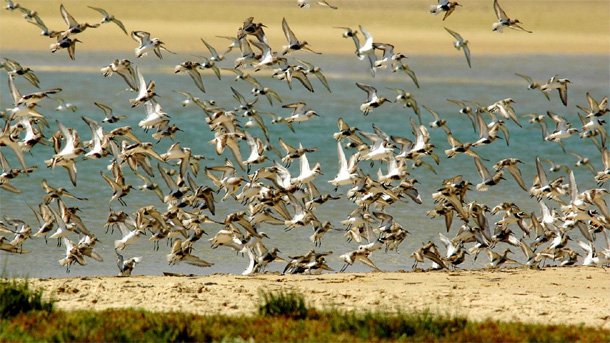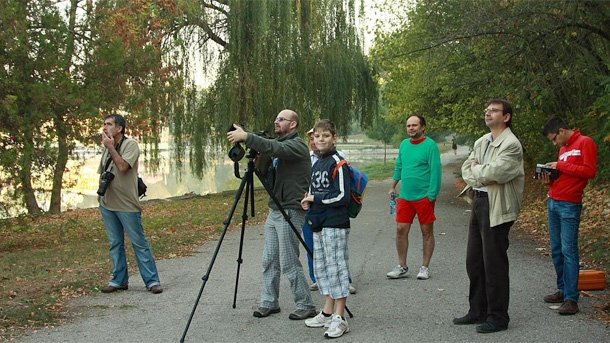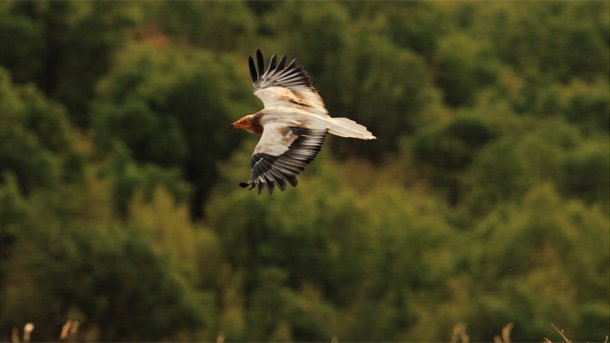

© Photo: coutesy of BBPS
However, this year the most interesting observations were spared for those, who were part of the Balkan project for the protection of the Egyptian Vulture, implemented by the Bulgarian Society for the Protection of Birds /BSPB/, a long-year partner of BirdLife International. Satellite transmitters were put for a first time over the summer on 9 young vultures and on one old – four from Greece and five from Bulgaria. An experiment of this kind took place a couple of years ago, when a transmitter was put on a young vulture, born in Macedonia. Unfortunately the young bird died after reaching Chad, Africa. Observers are not always fully aware of the dangers of migration, especially of the young birds’ initial one.
Two of the young vultures traced this year had a poor destiny. The satellite transmitter of Odysseus, born in Greece, went silent even before the bird crossed the border. The reasons for the lethal end remain unclear.

© Photo: lifeneophron.eu
Another young vulture with the beautiful name Icarus made the wrong choice of a migration route and is probably also dead, Stoyan Nikolov, head of the project says.
“The young bird tried to cross the Mediterranean Sea at its widest part and didn’t follow the traditional route of vulture migration across the Bosphorus,” the expert explains. “One night we lost the signal over the sea and our guess is that Icarus found its death there. Sometimes young vultures are misled by their instinct and do not find the right trace to the South. Icarus wandered over Greece for several days, reached the island of Cyprus and started to cross the Mediterranean Sea from there. That was a wrong, deadly choice due to the lack of experience…”
The other young birds have already reached successfully their new southern habitats, along with the older vulture. Young Svetlina, Lefkithos and Dobri are in Egypt now, Arda is in Lebanon and Volen is in Sudan. Iliaz, named after the person from East Rhodope that had guarded its nest over the summer, picked up the best migration route. It also set some sort of a record, since it flied off last and arrived before the others.

© Photo: lifeneophron.eu
“Iliaz started its migration too late and we were even worried that something was wrong,” Stoyan Nikolov says. “However, it traveled more than 4,000 km for 15 days only and took over the others. The bird covered some 320 km per day and over the Sahara desert it set a record of 536 km for a single day! Currently Iliaz resides with the older vulture in Chad.”
The reason for the success of Iliaz was a simple one – it was the only vulture that started the adventure with an older and experienced bird. Iliaz was lucky.
“As a whole, young vultures have the instinct to migrate to the South, but are unaware of the concrete routes. If there are any older birds around them, they guide the younger fellows, since their experience has been proven, they know the traps and safety areas across the Bosphorus, Asia and Africa. The problem is that there are not enough older Egyptian Vultures in the area to lead the others. That is why we do our best to increase their number in the Balkans.”
English version: Zhivko Stanchev
The Museum of the Bulgarian National Revival in Varna presents a collection of 15 authentic folk costumes from the collection of the Historical Museum in the town of Popovo. The valuable costumes are from the regions of Elhovo,..
Deanna Haag was born in Cleveland, Ohio, USA. She grew up dreaming of adventure and new horizons. After graduating from Wittenberg College in Ohio with a degree in Fine Arts, her life took an unexpected turn. The young American stood out for her..
Support for the activities of the Institute of Social Activities and Practices in Sofia is the cause that will unite organizers and guests of the Viennese Ball, which has become a tradition for the Bulgarian capital. This year's edition, scheduled..
Easter 2020 went down in history with two things. The first was the state of emergency, introduced due to the Covid-19 pandemic that..
152 years after the death of the Apostle of Freedom, the personality of Vasil Levski continues to excite Bulgarians, regardless of whether they are in the..

+359 2 9336 661
